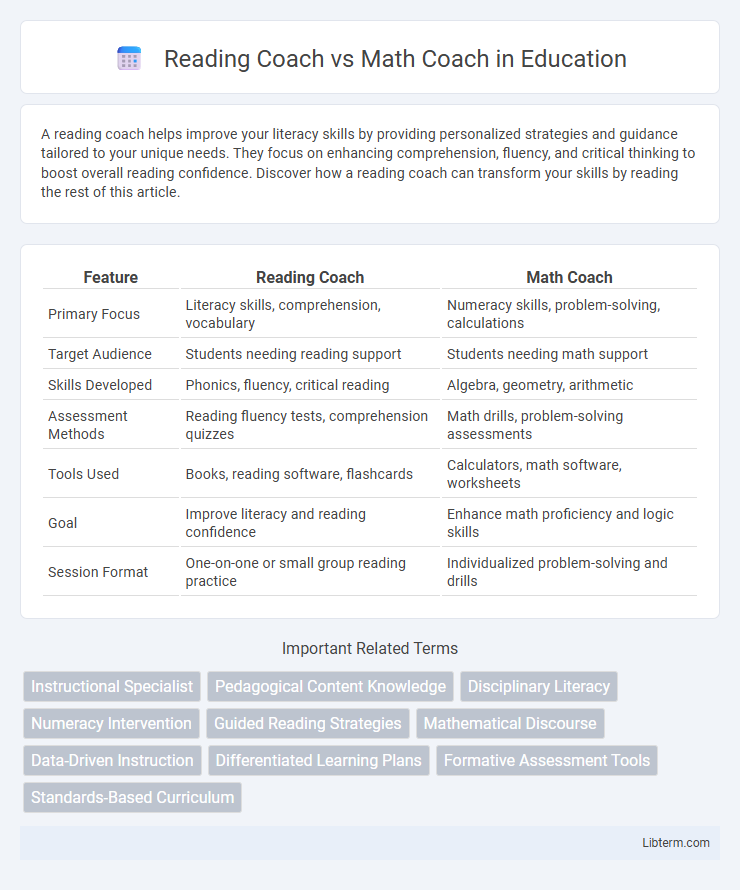A reading coach helps improve your literacy skills by providing personalized strategies and guidance tailored to your unique needs. They focus on enhancing comprehension, fluency, and critical thinking to boost overall reading confidence. Discover how a reading coach can transform your skills by reading the rest of this article.
Table of Comparison
| Feature | Reading Coach | Math Coach |
|---|---|---|
| Primary Focus | Literacy skills, comprehension, vocabulary | Numeracy skills, problem-solving, calculations |
| Target Audience | Students needing reading support | Students needing math support |
| Skills Developed | Phonics, fluency, critical reading | Algebra, geometry, arithmetic |
| Assessment Methods | Reading fluency tests, comprehension quizzes | Math drills, problem-solving assessments |
| Tools Used | Books, reading software, flashcards | Calculators, math software, worksheets |
| Goal | Improve literacy and reading confidence | Enhance math proficiency and logic skills |
| Session Format | One-on-one or small group reading practice | Individualized problem-solving and drills |
Introduction to Reading Coach and Math Coach
Reading Coaches specialize in literacy development by providing targeted strategies to improve reading comprehension, fluency, and vocabulary across diverse student populations in K-12 education. Math Coaches focus on enhancing mathematical understanding and problem-solving skills through collaborative teacher training, curriculum alignment, and data-driven instruction to boost student performance in arithmetic, algebra, and geometry. Both roles serve as instructional leaders, but Reading Coaches emphasize linguistic literacy while Math Coaches concentrate on quantitative reasoning and numeracy skills.
Key Roles and Responsibilities
A Reading Coach specializes in developing literacy skills by implementing strategies that enhance phonemic awareness, comprehension, and fluency, while providing targeted support to struggling readers and collaborating with teachers to integrate effective reading instruction. A Math Coach focuses on improving mathematical understanding and problem-solving abilities through data-driven interventions, lesson modeling, and professional development for educators to strengthen curriculum delivery and student engagement. Both roles involve analyzing student performance, offering personalized coaching, and fostering collaborative environments to boost academic achievement in their respective subject areas.
Core Skill Sets Required
A Reading Coach requires core skill sets in literacy development, phonemic awareness, and comprehension strategies to support diverse learners in acquiring reading proficiency. A Math Coach must possess expertise in numerical reasoning, problem-solving techniques, and conceptual understanding to guide students and teachers in mastering mathematical concepts. Both roles demand strong communication skills, data analysis abilities, and instructional coaching strategies to effectively enhance student achievement.
Daily Tasks and Interactions
Reading coaches analyze student literacy levels through assessments and model effective reading strategies during one-on-one or small group sessions. Math coaches support teachers by observing instructional methods, providing feedback on lesson planning, and facilitating math-focused professional development workshops. Both roles require frequent collaboration with educators to tailor interventions that address individual student needs and improve academic outcomes.
Strategies for Student Engagement
Reading coaches employ strategies such as interactive read-alouds, personalized book selections, and questioning techniques that promote critical thinking to enhance student engagement. Math coaches focus on manipulatives, real-world problem-solving tasks, and visual representations to make abstract concepts accessible and engaging. Both roles utilize formative assessments and collaborative goal-setting to tailor instruction and maintain student motivation effectively.
Assessment and Progress Monitoring Techniques
Reading coaches utilize formative assessments such as running records and fluency checks to monitor student progress in decoding, comprehension, and vocabulary acquisition. Math coaches employ diagnostic assessments and frequent skill-based quizzes to track student understanding of concepts, problem-solving abilities, and computational fluency. Both types of coaches implement data-driven progress monitoring systems to tailor instruction and support targeted interventions effectively.
Collaboration with Teachers and Staff
Reading coaches collaborate closely with teachers and staff by providing targeted literacy strategies, modeling instructional techniques, and analyzing student reading data to enhance classroom practices. Math coaches support educators through co-planning lessons, delivering professional development on mathematical concepts, and facilitating problem-solving discussions to improve student achievement. Both roles emphasize building strong partnerships with school personnel to tailor interventions and foster an integrated approach to student learning.
Professional Development Opportunities
Reading coaches specialize in literacy interventions, phonemic awareness, and comprehension strategies, offering professional development that enhances educators' skills in teaching reading and writing. Math coaches concentrate on numeracy skills, problem-solving techniques, and curriculum alignment, providing targeted training to improve mathematical instruction and student outcomes. Both roles deliver tailored workshops, classroom observations, and collaborative planning sessions that foster continuous teacher growth and effective instructional practices.
Impact on Student Achievement
Reading coaches improve student achievement by targeting literacy skills, increasing reading fluency, comprehension, and vocabulary, which are critical for academic success across subjects. Math coaches enhance student performance by deepening conceptual understanding, problem-solving abilities, and numeracy skills, leading to higher test scores and increased confidence in mathematics. Both roles leverage data-driven instruction and personalized support, resulting in measurable growth in student outcomes within their respective domains.
Choosing the Right Coach for Your School
Selecting the right coach for your school depends on its specific academic needs and student performance goals. A Reading Coach specializes in literacy development, focusing on phonics, comprehension, and fluency strategies tailored to diverse learners. In contrast, a Math Coach targets numeracy skills, problem-solving techniques, and conceptual understanding to enhance mathematical proficiency across grade levels.
Reading Coach Infographic

 libterm.com
libterm.com